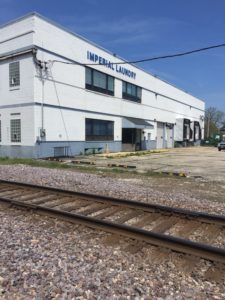Efforts to assess possible contamination at a decades-old industrial site in Racine’s uptown area will get a boost with a recently issued brownfields grant from the Department of Natural Resources.
The award comes from the DNR Wisconsin Assessment Monies (WAM) program, and will provide for contractor services worth approximately $20,000. The work will help the Redevelopment Authority of the City of Racine (RDA) assess possible contamination, leading to a potential cleanup and eventual reuse of the site.

Racine assessed this brownfield site in the uptown area with help from a WAM award worth $20,000 in contractor services.
The nearly one-acre site on 13th Street has a long history of various industrial uses. It was most recently the site of a laundry service for the health care and hospitality industries. Historic records from the Racine Fire Department indicate that a 500-gallon underground fuel oil tank was located on or near the property.
With the RDA ready to promote the property, an investigation of the environmental conditions on the site will help put the group in a better position of securing a buyer and returning the site to productive economic status.
“As Racine continues to redevelop former industrial sites, the DNR is proud to be part of the city’s future,” said Christine Haag, chief of the DNR brownfields section. “This WAM grant could be just the leverage that the RDA needs to help turn this property around and get it on track for the next generation of use.”
Administered by the DNR Remediation and Redevelopment Program, WAM awards provide communities with professional environmental site assessments of properties with known or perceived contamination. The program is funded through a U.S. Environmental Protection Agency brownfields assessment grant.
Participation in the WAM program requires minimal effort by local governments. Because there is no financial match or project administration involved, the program is an attractive opportunity for communities. In many instances, WAM awards are leveraged with other sources of funding to kick-start repurposing efforts on properties that may have been underutilized for many years.
Applications can be submitted for WAM awards at any time. Properties eligible for funding include closed or closing manufacturing plants, or vacant land with a history of manufacturing.
For more information, contact Tom Coogan at 608-267-7560 or Thomas.Coogan@wisconsin.gov.

